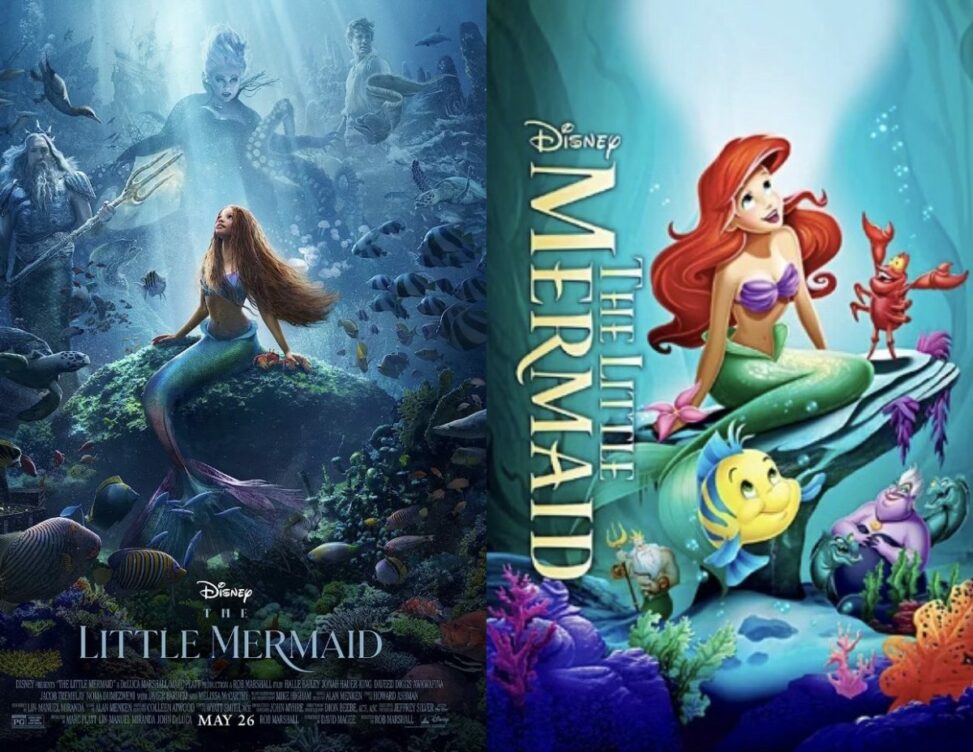The Little Mermaid is a household film for generations. The original book was released in 1837 by Danish writer Hans Christian Anderson, later followed by the hugely successful Disney film in 1989 and was once again redone with the live action adaption in 2023. From 1989 to 2023 Hollywood has changed into a more diverse group of actors, filmmakers and production team. In the 2023 adaptation Ariel (The main character in The Little Mermaid) was played by actor and singer Halle Bailey, which sparked outrage, debate and controversy. All because Halle is a person of color, which is not how Ariel is described in the original book and first film.
Growing up girls had beautiful princesses, mermaids and royals to look up to in film, literature, and basically everywhere in culture, well at least white girls did. Looking back on Disney films we can see nearly all the films had a white woman as the main role, for example: Sleeping beauty, snow white, the little mermaid and many others across the movie landscape. The overall racism and discrimination led to an exclusively white Hollywood. As the world changes, people of color are being given roles that they would never have been allowed to do before. We have seen Falcon in the Marvel cinematic universe, Lucas in Stranger Things and a whole plethora of non-white actors flood the movie scene. A big point of contention is the lack of diversity in the classic movies which have been primarily written and produced in times where racism was heavily dominating the choices of minorities, the introduction of live action remakes has allowed people who haven’t been able to see themselves portrayed in movies to see themselves in the characters on the screens. Although we have seen a deeper exploration of BIPOC in movies, The Little Mermaid was the first black princess in a live action movie.
The backlash from using Halle Bailey, instead of white actor was quick and fierce. The hashtag #NotMyAriel became trending on Twitter and Instagram. When asked about the racist comments and offensive responses Halle told The face “As a black person, you just expect it and it’s not a shock anymore” with a shrug and a sad smile. TikTok was soon flooded with videos of little black girls seeing the trailer and yelling “She’s black like me” which Halle told The Face “Made me cry for 3 days straight” The movie became so much more than just “The little mermaid” it became a symbol, a symbol of equality and of the changing times. Representation in the media we consume is incredibly important for children, teens and adults. The backlash was quickly drowned out by the uproar of support for Halle and her team, making her the first black women to play the main lead in a Disney princess movie. The phycological impact of seeing someone who looks just like you being a star and a mermaid always children of color to think “Thats just like me” The increase of black representation also effects white children too by showing them that black people are just as important as them and deserve the respect and praise just as much. Bringing the black community into the picture allows for equal opportunities and an overall healthier view on BIPOC. The movie sparked Mattel to create an Ariel Barbie based on Halle. Children deserve to see themselves as equal members of society.
It’s honestly just plain stupid why someone would be opposed to there being a black mermaid when in fact mermaids are not real. There are no such thing as real mermaids so why does it matter about the skin color of her? The mermaid is a fictional story and being that has been found in many cultures, including black culture. Do people really care about how mermaids should be historically representid or is it blatant racism, I have yet to see a claim backed by facts for “Only white mermaids” which points to blatant racism. The world is changing, with more and more BIPOC coming into films, media and taking on roles seen before as “white roles”. The Little Mermaid went on to earn an estimated $567.9 million dollars (USD) and is viewed as not only a commercial success but a cultural success as well.
Sources:
Google Books. “Black Film, White Money,” n.d.
https://books.google.ca/books?id=9KnqcVD9LoQC&lpg=PP9&ots=tgpRrYbpwe&dq=black%20people%20in%20film&lr&pg=PP5#v=onepage&q&f=false.
Temple Now | news.temple.edu. “The Importance of Representation: What Disney’s Black Little Mermaid Means for the Film Industry,” August 4, 2023.
https://news.temple.edu/news/2023-05-17/importance-representation-what-disney-s-first-black-live-action-princess-means-film#:~:text=On%20the%20significance%20of%20casting,themselves%20reflected%20in%20the%20media.
Face. “Editor’s Letter: Spring 2023.” The Face, February 23, 2023.
https://theface.com/magazine-1/editors-letter-spring-2023-vol-4-issue-14-halle-bailey-little mermaid-disney.
Putri, Zalfa Melanie. “Perbandingan Dalam Film Animasi the Little Mermaid (1989) Dan Versi Adaptasi Live-Action the Little Mermaid (2023).” Syntax Idea 5, no. 6 (June 21, 2023): 612–20. https://doi.org/10.46799/syntax-idea.v5i6.2374.


Martin Kalousek
Your analysis of the new “The Little Mermaid”, covers a lot of important aspects for the push on DEI. You present her as a role model for young coloured kids and adults alike. One thing is if you did further research you would see that there were in fact films with people of colour. As your point states “well at least white girls did”, when talking about older movies. The princess and the frog? The jungle book? Emperor’s new groove? Mulan? I think you take a very hard stance on your opinion without considering the other aspects of film history and that point. I like all the examples you used like including the backlash from the media insinuating that there is in fact racism towards people of colour, I will not deny that. The two images chosen convey the changes in appearance very well from cartoon to live action. It was refreshing to hear just how much this affected young children of colour when you mentioned them taking to social media saying “she looks just like me”. I think it is in fact important for all walks of life to feel included. We must also take into account how much instead the backlash being “drowned out”, but instead removed from the internet. One scary thing I find is how much the government controls the media in Canada. Is what you’re seeing in the media, actually what everyone thinks? I remember when this movie first came out the takes were generally negative, not just because of the changes in colour but because the live action adaptation was just plain disappointing. Now when I go back to look I see all major articles and comments taking the other side of your point have been removed and wiped from the web. The sources match your research well.